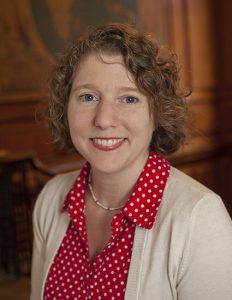Lynne M. Thomas, head of The Rare Book & Manuscript Library, has won a Hugo Award—science fiction’s most prestigious award. Thomas is now an eight-time Hugo Award winner.
Hugo Award winners were announced at the 77th World Science Fiction Convention in Dublin, Ireland, on August 18, 2019. Thomas won for Best Semiprozine (a non-professional periodical publication) for Uncanny Magazine. Thomas is the co-editor-in-chief and publisher of Uncanny Magazine with her husband Michael Damian Thomas.
Past Hugo Award wins for Thomas include Chicks Dig Time Lords: A Celebration of Doctor Who by the Women Who Love It (Best Related Work) in 2011; SF Squeecast (Best Fancast) in 2012 and 2013; Uncanny Magazine (Best Semiprozine) in 2016 and 2017; and Best Editor, Short Form and Uncanny Magazine (Best Semiprozine) in 2018. A comprehensive list of her awards is found in the Science Fiction Awards Database at www.sfadb.com/Lynne_M_Thomas.
Read more at https://www.tor.com/2019/08/18/announcing-the-2019-hugo-award-winners/.

